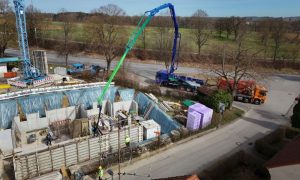Digital transformation strengthens real estate resilience
Identifying the drivers behind technology adoption and prioritising the areas of focus are necessary for stakeholders to connect more efficiently writes PNC Menon, Chairman of Sobha Group

Technology has seen significant advancements in recent years, helping companies improve their resilience, and ensuring business continuity. This was further accelerated during the pandemic, making it more important than ever for companies to quickly adopt digital solutions to ensure efficient business operations.
As a result of the implementation of these new technologies, the real estate industry is witnessing a rapid digital transformation in its operations. Key real estate players such as developers, brokers, agents, investors, and managers are adopting digital technologies, as well as revising skills and practices, in order to meet evolving customer demands.
As stakeholders of the real estate value chain look towards the future, there is a collective recognition of the need for sustainable, resilient, and affordable buildings. This vision can only be achieved through the adoption and implementation of digital tools. Due to the real estate industry’s capital-intensive, segmented nature, in addition to varying financial circumstances and timelines, adoption of new technologies has always been slower in the sector. However, a combination of trends, including COVID-19, evolving tenant demand, and continued pressure to deliver on environmental, social, and governance (ESG), has now resulted in a focus on digital solutions.
Furthermore, the pandemic has influenced stakeholders to reevaluate the relationship between built environments, and overall well-being, with an increased focus on ventilation, disinfection, touch-less applications, and a better understanding of space usage and density. The pandemic also brought into focus the importance of in-person socialisation and collaboration, resulting in a strong preference for wellness and environmental amenities, suggesting that occupancy strategies will likely change in the future.

Digital solutions are highly contributing to healthier spaces, while making buildings more competitive and facilitating a safer environment. Monitoring temperature, lighting, noise, and air quality in real-time has ensured tenant satisfaction and helped landlords resolve problems more quickly. Digitalisation of real estate requires strategies and privacy standards to understand data at asset and enterprise levels, to discover opportunities and bridge gaps. The use of digital technologies can provide a holistic view of commercial activities, allowing the collection and storage of a vast amount of data (big data), which can later be analysed automatically.
In addition, digital transformation also emphasises knowledge management, as much as identifying the right technology. It is believed that adoption rates can increase dramatically if the right individuals take charge and implement solutions, with multiple teams working together and leaders across segments of the business taking the lead together.
Digital transformation is undoubtedly a key driver to the real estate industry’s evolution. Identifying the drivers behind technology adoption and prioritising the areas of focus are necessary for stakeholders to connect more efficiently. Similarly, real estate players must also develop digital transformation strategies that address key obstacles like data access and capacity building, in order to overcome roadblocks as quickly as possible. It is clear that the industry is on the verge of transformation, and numerous opportunities exist for those that embrace this change.
Read more:
- AI in construction won’t be taking jobs, it will save lives
- Digital Construction Summit to take place on 14 September in Dubai
- How the UAE is future-proofing by being a Metaverse champion














